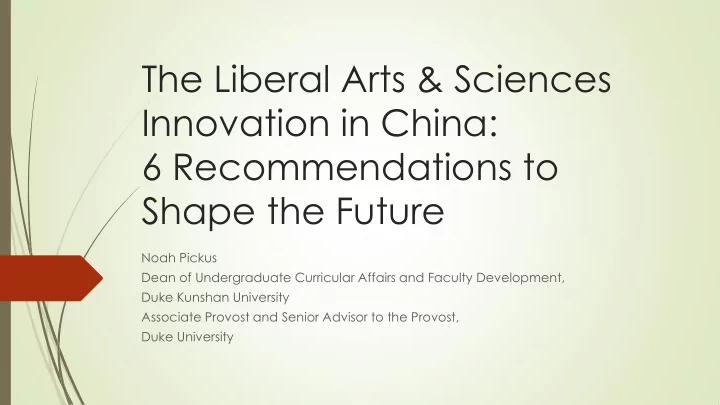

The Liberal Arts & Sciences Innovation in China: 6 Recommendations to Shape the Future Noah Pickus Dean of Undergraduate Curricular Affairs and Faculty Development, Duke Kunshan University Associate Provost and Senior Advisor to the Provost, Duke University
June 2017 Workshop 20 Institutions from Mainland China, Hong Kong, Singapore, the US and Canada: Tsinghua, PKU, Fudan, Shandong, CUHK Shenzen, East China Normal, Shanghai Jiao Tong, Renmin, Wuhan, Lingnan, University of Hong Kong, Yale- NUS, Duke, DKU, Harvard, Boston College, York, Kansas Pre-Workshop Interviews, Post Workshop Site Visits and Focus Groups Four Background Papers Yong Zhao, Reinventing Liberal Arts Education in China in the Age of Smart Machines William Kirby, Liberal Education in China Qiang Zha, What is Liberal Arts Education Kara A. Godwin, Co-Author in the 21st Century? An Exploration Starts Center for International Higher Education with Chinese Universities and Goes Boston College, Beyond China Gerard Postiglione, Ying Ma, & Alice Te, Institutionalizing Liberal Education in China: Obstacles and Challenges
The Liberal Arts & Sciences LAS is distinctively American -- yet criticized at home as lacking economic utility Ironically, LAS is increasingly embraced in China (and throughout Asia, as well as other parts of the world) Yet: A Problem of Translation: tongshi, boya, suzhi, quanren A Problem of Meaning: Arts & Sciences Describing What It Is: Core, Electives, Expertise, and Capstone Personalized, Purposeful, Problem-Solving
Rethinking Learning for the 21st Century 重新思考 21 世纪的学习 “The notion that we can go to college for four years and then spend that knowledge for the next 30 years is over. If you want to be life long employee anywhere today, you have to be a life long learner. 我们去上四年大学,然后之后三十年都能倚仗这四年学到的知识这种观 念已经过时。如果你想在当今时代的职场立于不败之地,你就必须成为 终生学习者。 ….Stop asking a young person WHAT you want to be when you grow up. 不要再问年轻人“你长大之后想做 什么 ” …. Ask them HOW you want to be when you grow up. Having an agile learning mindset will be the new skill set of the 21 st century.” 要问他们长大之后“ 如何 ”作为。保持灵敏机警的学习心态将是 21 世纪 Thomas Friedman, “Owning Your Own Future,” 的新技能。 NY Times, May 11, 2017 摘自 2017 年 5 月 11 日 Thomas Friedman 在纽约时 报上的文章《掌控自己的未来 》
In the Age of Smart Machines, liberal arts meets an urgent need in China and the world 通识博雅教育满足了中国和全世界在智能机器时代的迫切要求 “Liberal arts education . . . has the best chance to cultivate what is needed to succeed in a society that is globalized, rapidly changing, complex, and diverse. In the Age of Smart Machines, valuable skills and abilities are those that cannot be replaced by machines, no matter how intelligent machines may become. Some examples include creativity, innovation skills, learning to learn, adaptability, collaboration, communication, critical thinking, entrepreneurialism, and cultural intelligence . . . ” “ 通识博雅教育 … 是最有可能培养出在这个全球化,快速发展,复杂而多远的社 会中成功的人才。在智能机器的时代,真正有价值的是那些不管多先进的机器 也无法取代的技能和特质,例如创造力,创新能力,学习能力,适应能力,协 作能力,沟通能力,批判性思维,创业能力和对文化的敏感度 … ” Yong Zhao, PhD, 赵勇博士 Foundation Distinguished Professor, 杰出教授 U of Kansas School of Education 堪萨斯大学教育学院 “Reinventing Liberal Arts Education in China in the Age of Smart Machines” 《在智能机器时代的中国重新定义通识博雅教育》
A Pivotal Moment LAS Attributes are not new in China Yet most Chinese higher education is highly utilitarian So implementing LAS is not universally welcomed or an easy sell Yet China has an opportunity to move from imitation to influence What if China invented it’s own LAS education that, like WeChat, fit the culture and improved the model? (Yong Zhao)
Six Recommendations Shared Obstacles: Recommendations 1-3 Apply To Most Universities, West and East, But Take Distinctive Forms In China
1. Make General Education Matter Common Core or Distributional Model An Example: The University of Hong Kong Yet . . . Some Students See: Extras & Encumbrances What’s Needed: A Relentless Focus on Quality Attention, Resources, Making the Case, and . . .
2. Invest in Interdisciplinary Integration General Education alone is playing catch-up in a losing game. The future demands problem-solving that requires integrated, interdisciplinary – not just multidisciplinary – skills and habits of thought Some Promising Experiments: Yuanpei College Xinya College Fudan Upgrade Plan 2020 Lingnan University Obstacles to Expansion: university bureaucracy, disciplinary divisions, lack of cooperation among departments Needed: a common philosophy, a spirit of collaboration, and shared goals for student learning
2a. A Joint Venture Example Shared 共享的 Signature Integrated 标志性 综合的 Flexible Immersive 沉浸式 灵活性
3. Focus on Faculty Incentives & Development Changes: From transmission to interpretation From teacher centered to learner centered Challenges: Faculty inexperience and development Rewards and role definitions The faculty view?: LAS is supported in theory more than in practice (Postiglione, Ma, and Te) – hence the importance of systems and leadership
Six Recommendations China’s Opportunity: Recommendations 4 -6 If WeChat was a University or a Universities learned from WeChat
4. Embrace Innovative Pedagogy Engaging faculty in what graduates should know and do Two Examples (Yong Zhao): Entrepreneur Orientation Product Orientation China’s co -curricular opportunity in agency and ownership
5. Scale Quality Programs The problem of quality and the problem of scale Two U.S. Examples: Arizona State University Minerva Schools China’s Opportunities: Experimentation, Experimentation, Experimentation Make innovations scalable as they are introduced
Study Multiple Traditions Toward a Rooted Globalism The Socratic and the Confucian Culture and ideology courses Justice in Karl Marx and John Rawls
Conclusion Challenges & Opportunities Integration & Experimentation Making STEM Better LAS as a global force – will China be among the leaders?
Recommend
More recommend